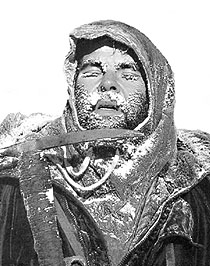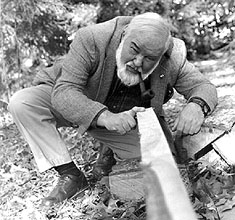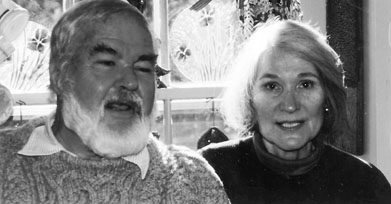
NBT Interview:
Travelin' Man
From the Nile River to the
mountains of Tibet, Shady Side's Tom Abercrombie trekked the world during
an adventure-filled 40-year career for National Geographic.
Tom Abercrombie is not one for overstatement or self-promotion. But he suggests that an artifact in his living room might be among the oldest in Anne Arundel County: It's an Egyptian sarcophagus, from the 12th century B.C. After a career of far-flung travels, any manner of artifact might materialize in Abercrombie's home along the West River in Shady Side. You may find yourself under the agate-eyed gaze of an authentic monk's skull, sawed off at the top for drinking blood. Or holding an ivory-like, two-foot-long walrus penis that functions these days as a bookmark for a dictionary on a stand. A large, unabridged dictionary.
Then there's the ferocious wooden statue of a corpse that served as a symbol to remind Easter Islanders that all of their ancestors lurk among them. "He's a scary little guy," Abercrombie says with an impish grin.
Scarier still is a shrunken head. Abercrombie bought it from a colleague whose wife couldn't live with it.
But not much frightens Abercrombie, who's seen sights on this earth that his fellow humans only dream of. He was a correspondent and photographer for National Geographic from 1956 until, well Supposedly he's retired. But he's still writing books with the magazine, compiling his own memoirs and building a 26-foot skipjack in his spare time.
Abercrombie, 68, a Minnesotan by birth, speaks five languages and has traveled to more than 80 countries, often with his wife, Lynn, as his photographer, for one of the most famous periodicals on earth. He was the first journalist to the South Pole. He and Lynn were the first journalists given free rein in Marxist South Yemen. Years of travels in the Arab world affected him deeply.
His exploits were legendary during an era of footloose, expansive journalism when time and money raised no barrier to the quest for quality. For an assignment in Alaska, Abercrombie, a pilot, bought an airplane, a startling find for the bean-counter examining his expense account. To write about Wyoming, he rented a 40,000 acre ranch that came with a herd of wild horses.
He knew what could pass muster on his expense account and what couldn't. In North Yemen when he bought two AK-47 automatic rifles (one for him and one for his driver), he put it down as "auto insurance."
Abercrombie - whose years at National Geographic coincided with the eminent journal's golden age, when circulation soared from two to 10.5 million - lived the life journalists dream of.
With his uncommon energies and his mischievous blue eyes, Abercrombie is a character at home, too. Once, when he had Beirut visitors, he went outside his West River home and fired off a few rounds from a .45. "Tom, what are you doing?" someone asked.
"Just trying to make these people feel at home," he replied.
While unpacking boxes for a book on his travels, he sat down with NBT's Bill Lambrecht on two recent occasions to talk about his life.
Q You supposedly retired in '95. Since
then, I've seen at least two big National Geographic pieces under your byline.
Today, you t ook two oak trees to a saw mill.
You're writing books and building a boat. Is your retirement a hoax?
ook two oak trees to a saw mill.
You're writing books and building a boat. Is your retirement a hoax?
A I'm officially retired; that is they don't pay me money anymore. The office calls quite a bit, particularly about the Middle East or if they get an Arabic language question or whatever. They called me the other day when they had a picture of an astrolabe. They wanted to know whether it was for land use or for navigating ships. I should become a consultant because they pay consultants.
Q What is it that you've been writing?
A I just finished the text for a picture book. So it's a pretty short text. It's about one of our photographers, a guy named Duke Stanfield, who is the archetypal Geographic photographer. He's the most published, I think, of any of our photographers. He has an enormous body of work and has been every place. He's also retired. But if you think I'm not retired, here's a guy who's really not retired. As far as I can tell, retirement means slowing up from 18-hour days to 16-hour days.
Q You're doing your memoirs, too, right?
A I'm toying around with a book and I've got a couple nibbles. I'm trying to do the standard package and I've just about got it ready to shop around a little. I put off doing it. I thought well, I really don't have that much stuff. But once I got started, I realized that that's really no problem. I've got way too much stuff.
It ain't like in the movies when a guy says, 'Oh, I think I'll write a novel,' and he sits down. It's an awful lot of work but I'm enjoying it. I don't know why I'm doing it; there are probably a billion copies of my articles out there. I've got my paper tomb.
Q You seem to have developed a special love for the Middle East.
A The Middle East is a very interesting place for several reasons, not the least of which is that it's not very well known. Yet what we define as civilization began there. Our legal system and, of course, our religions began there. For a long time, even before Europe got its feet out of the mud, so to speak, before the Dark Ages, the Middle Eastern cultures were thriving and getting Europe ready for the Renaissance This place has a strong influence on us, but Americans don't know anything about it.
Q Am I right that you became a Moslem in the mid-1960s?
A I think it was '65 or '66.
Q Were there a lot of young guys from Minnesota who were converting to Islam in the '60s?
A No, not so many, although I've gotten a lot of letters from people who have. It's a religion greatly suppressed in this country.
I think it's safe to assume that most people know nothing about Islam. You see the television portrayals of a lot of people praying in a mosque someplace Same old stuff, a lot of clichés.
Q Is your Islamic faith still part of your life?
A Yes, but not part of my public life.
Q I read your great story on Afghanistan in which you played that wild game of grabbing the dead goat while riding biting, kicking horses
A It's not much different than driving on the Beltway.
Q I see journalists in Washington who do their traveling on the Internet to the wire services and the day's speech transcripts, then they write their story. You did it a bit differently.
A It was the Geographic style, essentially a first-person approach. Of course, that's one of the things I liked about it. You couldn't write about buz kashi [the Afghan horse sport] off the Internet. But maybe by now, they have the electronic game. (He laughs.)
The way I got chummy with the players, who are not a real chummy bunch, was that I was photographing and a horse chewed one of these guy's ears right off. I had this hell of a first-aid kit I carried around. I had damn near a hospital; this huge fishing tackle box full of morphine and sharpened scalpels. So I fixed this guy's ear up and made him feel a little better.
That's an awful nasty game; I'm sure these guys were going easy on this funny foreigner who was fiddling around.
Q Did you ever get badly injured or seriously ill?
A No; it was amazing luck. I had a lot of close calls. I wrapped up a couple of airplanes and walked out of that. When I was in Tibet, I got typhoid, but I didn't come down really seriously with it until the last day in China. From the border down to Nepal, I thought I was going to die. I was getting stiff, I mean like a board, and I was turning blue. Lynn was really scared. You can't eat, you can just barely breathe. Lynn got me to a little Canadian clinic on the worst taxi ride of my life. They said, 'We know what this is.' It took me two weeks before I could walk.
At the time I came down with it, we were supposed to be on a 10-day hike into the Himalayas. The reason we weren't was that we got arrested by the Chinese army and we made a run for it. We had the yaks all packed and we were already to go up into the high country. It was a good thing [we got arrested] or you wouldn't be interviewing me today.
Q It had to be the best of both worlds
to have Lynn with you on your adventures.
A Of course, in terms of family life. But also, traveling alone is tricky business, especially when you have a lot of equipment - just a simple logistic thing of getting 10 suitcases from the baggage claim to the taxi when there is no porter.
Q Technology has galloped forward. Now, journalists in forbidding lands file by satellite phone and explorers put their finds up on the Internet instantaneously. Is magazine journalism better now?
A It doesn't matter whether you send it out by satellite or with a runner at the end of a forked stick, it's still the same mission: Somebody's got to go find out what the story is and tell the story.
Q You would spend months on stories. How long did it require to really take the heartbeat and the pulse of a place?
A The heartbeat and the pulse, that's no problem. Any doctor will tell you that, if you've got a stethoscope and you've got a watch. It's the psychology of a place. And what sort of place. For an American to go to England, you can get a hold of that. You go to Saudi Arabia, and you are upside down. The most extreme places, I think, are Japan and China. I don't even get the pulse there; it's Alice in Wonderland.
Q You did these elegant pieces blending history and culture with your first-person experience. Could you have done them for other magazines?
A Most didn't give you the free rein or the time. Even Geographic now is getting a little tight. Most magazines are after the frosting, but they don't really care about the cake At Geographic, if you had to have a helicopter or arrange an army or paint a whole factory green, they'd back you up on it.
Q I've heard you had some hellacious expense accounts.
A I never thought of myself as living it up on expense accounts, especially when you're camped at an Iranian truck stop or someplace like that. But the truth is, getting around does cost money Lynn and I made a three-day climb once and we made arrangements with a Brit helicopter to get out. Our three-day walk-up was a four-minute ride back in the helicopter.
Q Somebody must have jumped out of their chair when you bought the airplane. What kind was it?
AA 185 Cessna. On floats. Hell of a nice plane. I flew it back from Alaska right up the West River and tied it up to the dock for a month or so
There was a great deal of camaraderie at Geographic, with guys trying to outdo each other, out-amaze one another. Basically, it was a sound idea. I'm just glad I didn't wreck the thing. That could have diminished my argument. They sold it to the Fish and Wildlife Service and it flew back to Alaska.
Q You have spent a lot of time in Iraq, where we may be on the verge of dropping bombs. Are you troubled by this prospect?
A Greatly. For us, it's a national embarrassment. But for those people, it's pain and suffering. People are not going to die in cute ways, like in the movies. If they're lucky, they'll be vaporized by the smart bombs. There will be people who lose two legs and an arm and spend the rest of their lives with just a head and a torso with one arm. Some 23-year-old in his fancy outfit and shiny airplane should have to see these people. It would be like somebody taking off from Norfolk and blowing up Shady Side.
Q Now that you've been everywhere, how does the Chesapeake Bay stack up?
A There were some lovely places. There are corners of France that are very lovely places. And Spain; I love the heartland, not the coastal areas. Here, it's a peaceful setting. It's so quiet. It's a natural place. [Culturally] we've lost so much; everything we touch either is asphalt or Formica. We seem to have this national tendency toward psychotic behavior.
Here, there's a great deal of communing with nature. And the water is a symbol of peace, although it gets a little busy out there. Chesapeake Bay really is a highway to the world; I could put a few cans of beans on my boat and there's nothing between me and Australia but a couple of days.
Part of travel is dreaming about it. Then when you get back, you re-dream it. The world is a stimulating place and there are a lot of lessons to be learned, especially when you step outside your culture. There's a Persian proverb that says when you learn another culture, you've got another personality. You become somebody different ...
| Back to Archives |
VolumeVI Number 7
February 19-25, 1998
New Bay Times
| Homepage |